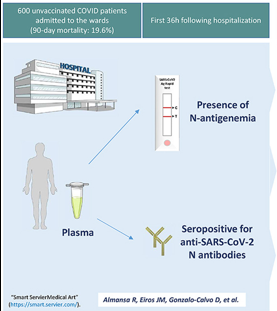The antigen test can predict mortality in COVID-19 if done in plasma
The study involved 600 COVID-19 patients hospitalised at the Río Hortega University Hospital in Valladolid, the Arnau de Vilanova Hospital in Lleida and the Santa María University Hospital in Lleida
Researchers from the CIBERESUCICOVID project, funded by the Instituto de Salud Carlos III (ISCIII), have demonstrated that the rapid antigen test, which is used to diagnose the disease in respiratory samples, can also be used to predict 90-day mortality in patients hospitalised with COVID-19, when the test is positive in plasma samples. This is a study of 600 COVID-19 patients hospitalised at the Hospital Universitario Río Hortega in Valladolid, the Hospital Arnau de Vilanova in Lleida and the Hospital Universitario de Santa María in Lleida during the second and third pandemic waves, which has been published in Clinical Microbiology and Infection.
"This study shows that we are not taking advantage of the full potential of the rapid antigen test in the management of COVID-19 patients," says Ferrán Barbé, scientific director of CIBERES at the Hospital Arnau de Vilanova and head of the Translational Research in Respiratory Medicine group at the Institute for Research in Biomedicine of Lleida (IRBLleida).
"Patients who present positive N antigen in plasma (antigenemia) on admission to hospital have twice the risk of dying in the following three months than those who are negative in this test," says Jesús Bermejo, researcher at IBSAL and the Río Hortega University Hospital in Valladolid, as well as head of this CIBERESUCICOVID sub-study.
According to the research, "the implementation of the plasma antigen test in the diagnostic routine would be simple and the test could provide very useful information to identify patients with worse prognosis". Antoni Torres, principal investigator of the CIBERESUCICOVID study and head of the CIBERES group at Hospital Clínic de Barcelona, points out that "these results support that the key to severe COVID-19 lies in the patient's inability to control virus replication".
The findings open the door to investigating the role of shedding of virus material into the blood in post-COVID-19 syndrome. The group is now evaluating the usefulness of plasma antigen testing in the emergency department.
This work reinforces previous findings from CIBERESUCICOVID, which early in the pandemic demonstrated that the presence of SARS-CoV-2 material in the blood is intrinsically related to the severity of COVID-19, results that were published in Critical Care and the Journal of Internal Medicine.
This work has been possible thanks to the financial support of the Instituto de Salud Carlos III, la Fundació La Marató de TV3, ESCMID Research Grant 2020 and by the Institut Català de la Salut and Gestió de Serveis Sanitaris (COVIDPONENT project). It has also been co-financed by the European Social Fund (ESF)/"A way to do Europe"/"Invest in your future").
Article reference:
Almansa, R., Eiros, J. M., de Gonzalo-Calvo, D., Postigo, T., Ortega, A., Lopez-Izquierdo, R., Moncusí-Moix, A., Gort-Paniello, C., Dominguez-Gil, M., Fuente, A. de la, González-González, L., Luis-García, T., García-Mateo, N., Tedim, A. P., Rodríguez-Jara, F., Jorge, N., González, J., Torres, G., Gutiérrez-Pérez, O. N., ... Torres, A. (2022). N-antigenemia detection by a rapid lateral flow test predicts 90-day mortality in COVID-19: a prospective cohort study. Clinical Microbiology and Infection, 0(0). https://doi.org/10.1016/j.cmi.2022.05.023
Text: CIBERES

The findings open the door to investigating the role of shedding of virus material into the blood in post-COVID-19 syndrome






